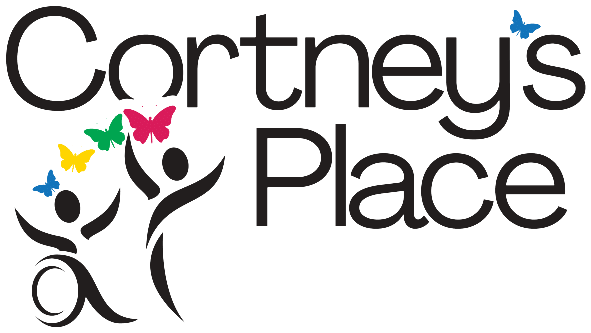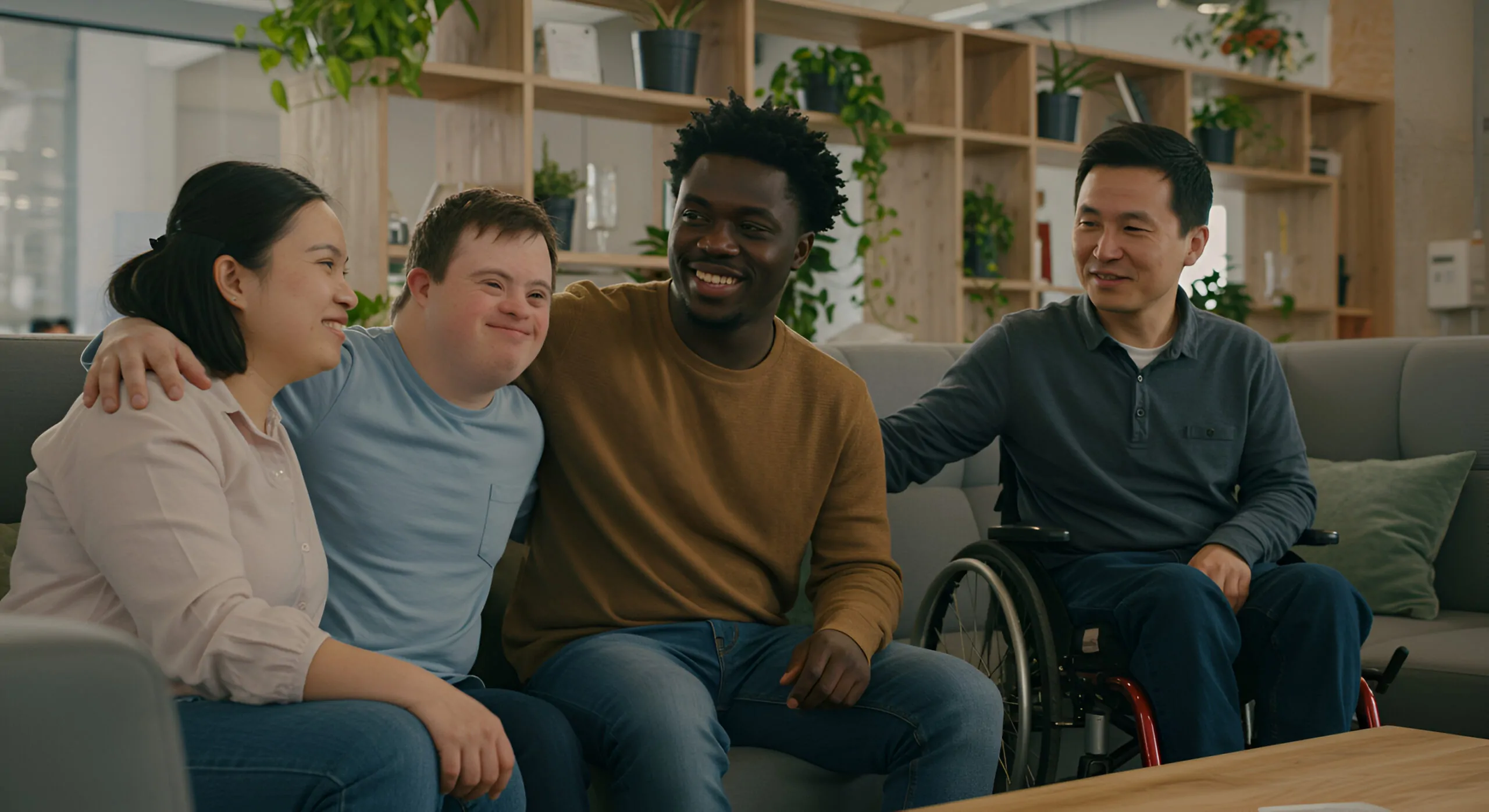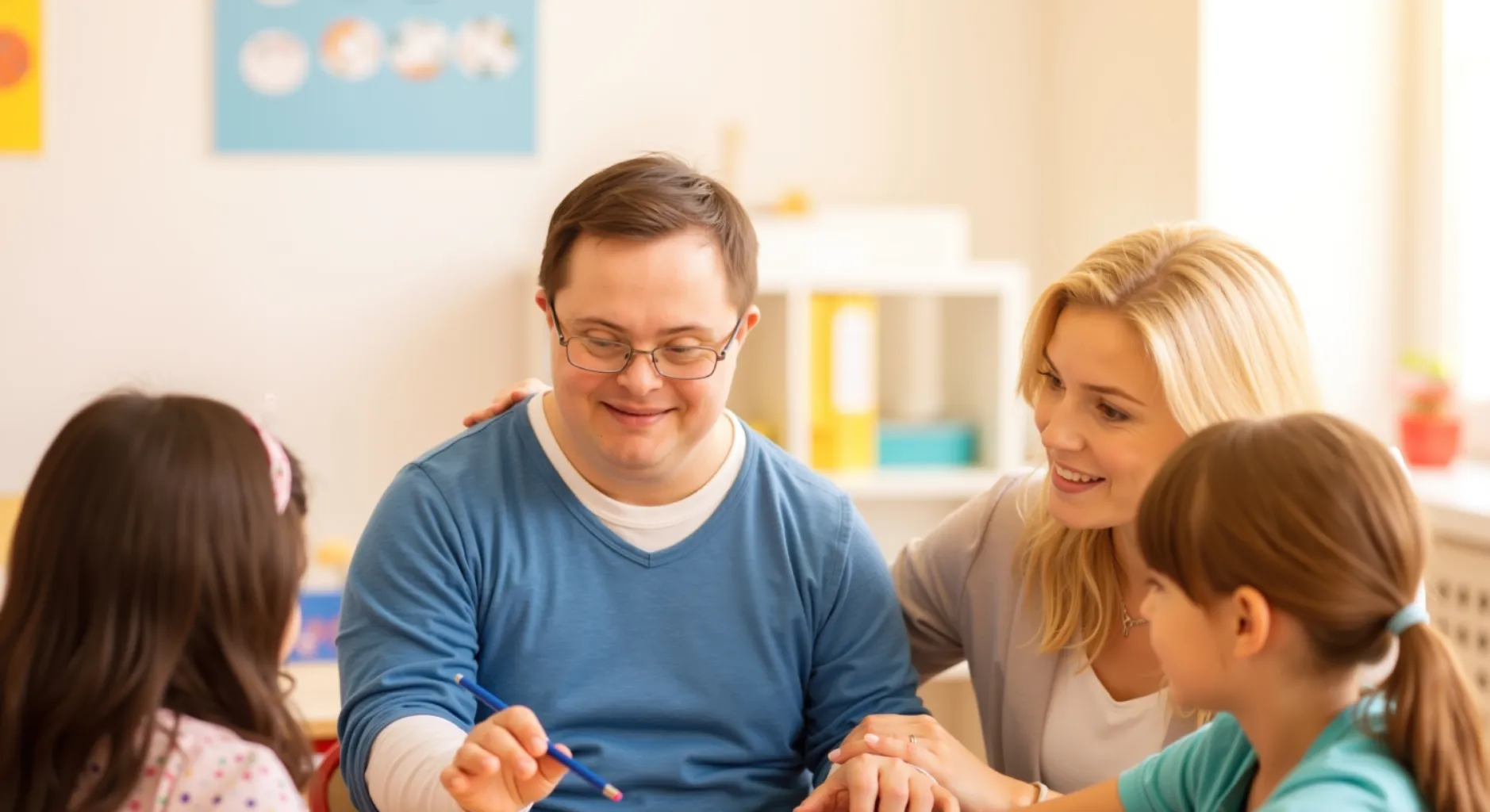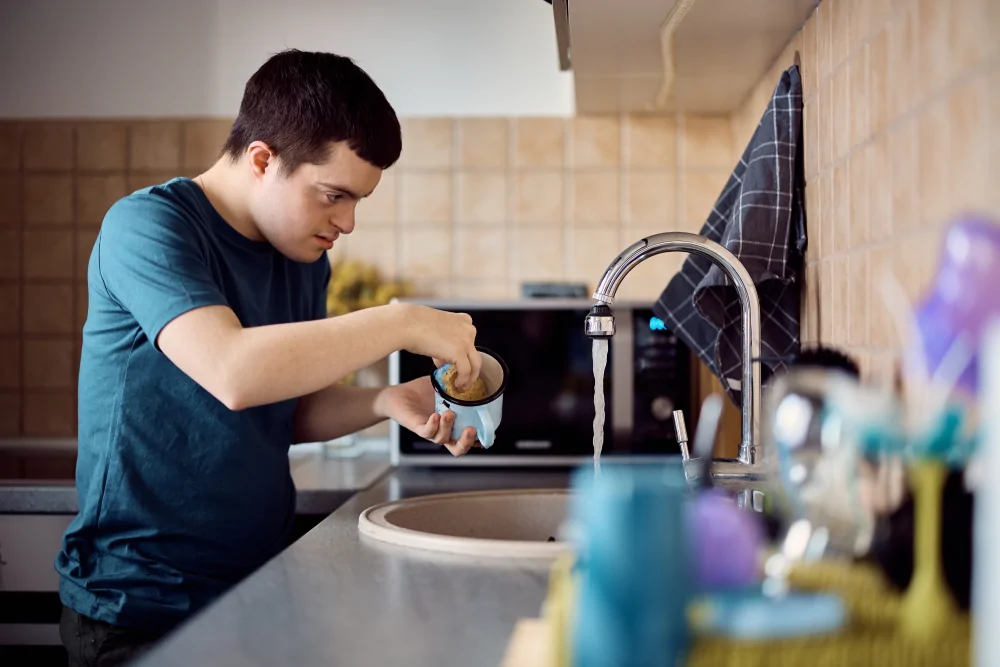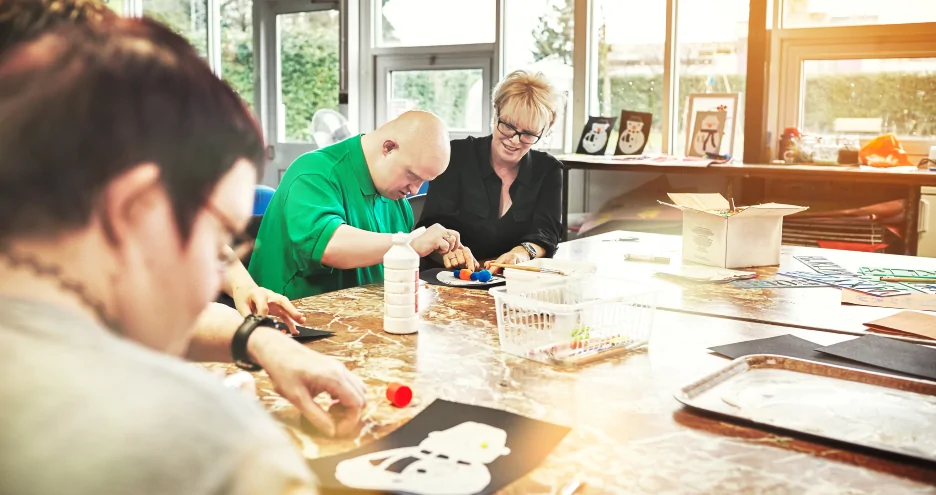Table of Contents
Community Integration for Persons with Disabilities
In a truly inclusive society, every individual has the right to participate fully and equally in community life. For adults with intellectual and developmental disabilities (IDD), community integration for persons with disabilities is not just a social ideal—it’s a human right. Yet, despite progress in awareness and policy, many individuals with IDD still face challenges to accessing education, employment, housing, healthcare, and social life.
Community integration is about more than simply living in the community—it is about being of the community. It means having meaningful relationships, opportunities for personal growth, chances to contribute, and the freedom to make choices. For organizations, families, and advocates working with adults with IDD, building pathways to full community participation is a priority that benefits not only the individuals themselves but society in general.
What Community Integration Means
Community integration means that adults with developmental disabilities participate in every area of daily life—from working and attending school to enjoying hobbies, maintaining good health, and getting involved in their communities. It’s about ensuring individuals are not only visible but actively involved in their communities, with opportunities for social connection, personal growth, and independence.
Key Components of Community Integration
Independent or Supported Living
Choosing to live independently or with some support gives individuals with developmental disabilities the freedom to decide how they manage their daily activities, where they live, and how they care for themselves. Supported living services actively assist adults, respecting their autonomy and enabling them to live in homes, apartments, or shared housing within the community. These services build confidence, encourage responsibility, and promote a sense of ownership over their lives.
Meaningful Employment or Volunteer Work
Employment and volunteer opportunities empower adults with IDD to contribute to society and gain a sense of purpose. Whether they’re employed at a local business or volunteering at a community center, these opportunities help individuals develop skills, form meaningful connections, and build confidence. Being part of the workforce also encourages the wider community to become more understanding and accepting.
Access to Education and Lifelong Learning
Learning doesn’t stop after school; adults with disabilities benefit from ongoing education in life skills, technology, communication, and personal interests. Accessible programs and adaptive teaching methods enable individuals to achieve their personal goals and continue growing. Lifelong learning enhances independence and opens doors to new opportunities.
Social Inclusion and Friendship
Building meaningful relationships is a vital part of a fulfilling life. Social inclusion occurs when people participate in clubs, hobbies, or local events—places where friendships can naturally develop and connections flourish. These interactions reduce isolation and create a supportive network that enhances emotional well-being.
Civic Engagement and Advocacy
Civic engagement includes voting, attending town halls, or speaking out on issues that affect people with disabilities. Encouraging adults with IDD to advocate for their rights builds self-determination and a sense of agency. Their voices add valuable perspectives and help shape more inclusive policies.
Access to Public Services and Spaces
Everyone deserves access to libraries, parks, transportation, healthcare, and other public resources. Thoughtful design and welcoming policies help remove obstacles, enabling individuals with disabilities to participate in daily activities fully. Equitable access fosters a sense of community belonging and reinforces the notion that public spaces are for everyone.
The Importance of Community Integration
Community integration for persons with disabilities means that adults with intellectual and developmental disabilities (IDD) are actively involved in their daily lives—whether at work, in school, or through social activities. Being part of the community helps these individuals grow by providing them with opportunities to learn new skills, make friends, and feel valued. It also helps them live happier and healthier lives by encouraging independence and confidence.
Including adults with IDD makes communities kinder and fairer for everyone. It shows that all people have something important to offer. Community integration also helps lower costs by reducing the need for expensive care in institutions, instead supporting people in living and thriving in their neighborhoods.
Benefits of Community Integration
Improved Mental and Physical Health
Being actively engaged in community life boosts emotional well-being and reduces feelings of loneliness or isolation. Physical health improves when individuals participate in recreational activities, access healthcare, and maintain a routine. A supportive community environment promotes both psychological resilience and physical wellness.
Greater Independence and Self-Sufficiency
Community integration helps individuals develop essential life skills, such as cooking, managing finances, and utilizing public transportation to navigate their daily routines. Gaining these skills boosts confidence and helps people become less dependent on family members or formal care settings. Over time, individuals gain the tools to make informed choices and lead more self-directed lives.
Reduced Stigma and Discrimination
Seeing people with disabilities participate in everyday life—working, socializing, and contributing—challenges stereotypes and shifts public perception. Visibility breaks down misconceptions and promotes empathy and understanding. Integration helps create a culture of acceptance and respect for diversity.
Enhanced Social and Family Relationships
As individuals build friendships and connect with peers, they create strong emotional support systems outside their families, strengthening their sense of belonging and self-worth. Families also benefit by seeing their loved ones lead active, fulfilling lives within the community.
Increased Participation in Civic Life
Being part of the community motivates individuals to take on civic roles, such as voting or participating in local events. It empowers them to speak up for themselves and others with disabilities. Getting involved in civic life reminds us all that every voice plays a vital role in building a more inclusive society.
Economic Contribution and Reduced Unemployment
Having jobs or volunteer opportunities allows adults with disabilities to give back in meaningful ways to their communities. Being part of the workforce helps them rely less on public assistance and gain greater financial independence. It highlights the value of diversity and inclusion in economic growth.
Strategies for Supporting Integration
Building inclusive communities takes purposeful effort, teamwork, and creative approaches. Below are some essential strategies to help support the full community involvement of adults with IDD:
Person-Centered Planning
Effective integration begins with understanding each individual’s unique strengths, goals, and preferences. Support services must be flexible and tailored to empower adults with IDD to make choices about their education, employment, and social activities. When individuals actively participate in planning, they gain confidence and a sense of ownership over their lives.
Inclusive Education and Lifelong Learning
Learning shouldn’t stop after the usual school years—it should continue to encourage ongoing growth and skill-building throughout life. Accessible community programs, vocational training, and adult education classes enable individuals to build practical knowledge and pursue their interests. Programs such as those offered at Cortney’s Place offer practical, hands-on lessons in communication, health, and everyday skills, helping individuals become more independent.
Supported Employment Programs

Inclusive Housing Options
Living arrangements that balance independence with necessary support enable adults with IDD to thrive in their communities. Living arrangements such as shared apartments or community group homes help residents maintain their dignity while fully engaging in neighborhood life. Locating housing near services and public spaces ensures accessibility and connection.
Transportation Access
Reliable and accessible transportation is critical for accessing jobs, education, healthcare, and social activities. Mobility training helps people learn to use public transportation with confidence and safety. By investing in paratransit services and designing transit systems to be more inclusive, we break down physical and logistical barriers, making it easier for everyone to get around and take part.
Public Awareness Campaigns
Raising community awareness helps break down stereotypes and encourages acceptance of people with IDD. When communities are educated about abilities and inclusion, they become more welcoming and supportive of individuals with disabilities. Promoting participation in local clubs, religious groups, and events fosters genuine social integration.
Family and Caregiver Support
Families and caregivers play a vital role in encouraging independence and advocating for inclusion. Offering training, respite care, and support groups provides families with the tools they need to help their loved ones become more integrated into the community. Strengthening these support systems ensures ongoing encouragement both within and beyond formal services.
The Role of Organizations Like Cortney’s Place
Organizations that focus on community-based services for adults with IDD are essential for making integration a reality. Cortney’s Place, for instance, is a nonprofit organization that provides a day program for adults with developmental disabilities, offering enrichment, education, and connection opportunities.
Through programs that teach life skills, offer vocational experiences, and support social engagement, Cortney’s Place helps individuals grow beyond the classroom or therapy session. More importantly, they create space for adults with IDD to build confidence, make choices, and belong.
Community Integration Activities for Persons with Disabilities
These real-life examples reflect Cortney’s Place’s commitment to not only teaching skills but also creating moments of connection and purpose that empower each participant to feel included and respected within the broader community.
- Attending Local Theater Performances
Participants attend live plays and musicals at local theaters, where they experience the arts firsthand, learn how to be respectful audience members, and discuss the shows afterward—helping them grow in cultural understanding and communication.
- Exploring Museums and Art Exhibits:
Visits to local museums and galleries offer hands-on learning and opportunities for sensory exploration. These outings spark creativity, critical thinking, and meaningful conversations about history, science, and art.
- Participating in Library Programs:
Weekly trips to the public library enable individuals to explore books, attend inclusive workshops, and engage in quiet social interactions within a community learning environment.
- Enjoying Nature and Wellness in Public Parks:
Group walks, picnics, and light exercise in neighborhood parks promote physical well-being, social bonding, and appreciation for the outdoors—often leading to spontaneous interactions with other community members.
- Engaging with Local Businesses and Events:
Trips to coffee shops, farmers’ markets, and seasonal festivals provide participants with practical opportunities to practice handling money, making choices, and connecting with their community—often sparking new friendships and a sense of belonging in familiar places.
Conclusion
Community integration for persons with disabilities is more than a goal—it is a fundamental right that affirms the dignity, potential, and humanity of adults with intellectual and developmental disabilities. By fostering inclusive environments where individuals can live independently, work meaningfully, learn continuously, and build genuine relationships, we create stronger, more compassionate communities for everyone. Through planning, collaboration, and unwavering support, we can break down barriers and open doors to opportunity, ensuring that every person has the chance to belong, contribute, and thrive.
Ready to make a difference?
Join Cortney’s Place in empowering adults with intellectual and developmental disabilities to live, learn, and thrive in their communities. Whether you want to volunteer, donate, or partner with us, your support helps build a more inclusive and welcoming world.
Contact Us!
We’d love to hear from you! Whether you have questions, would like to learn more about our programs, or are interested in getting involved, please don’t hesitate to reach out.
Phone: (480) 419-5852 (Scottsdale)
(602) 484-7610 (Phoenix)
Get involved today—because everyone deserves a place to belong.

